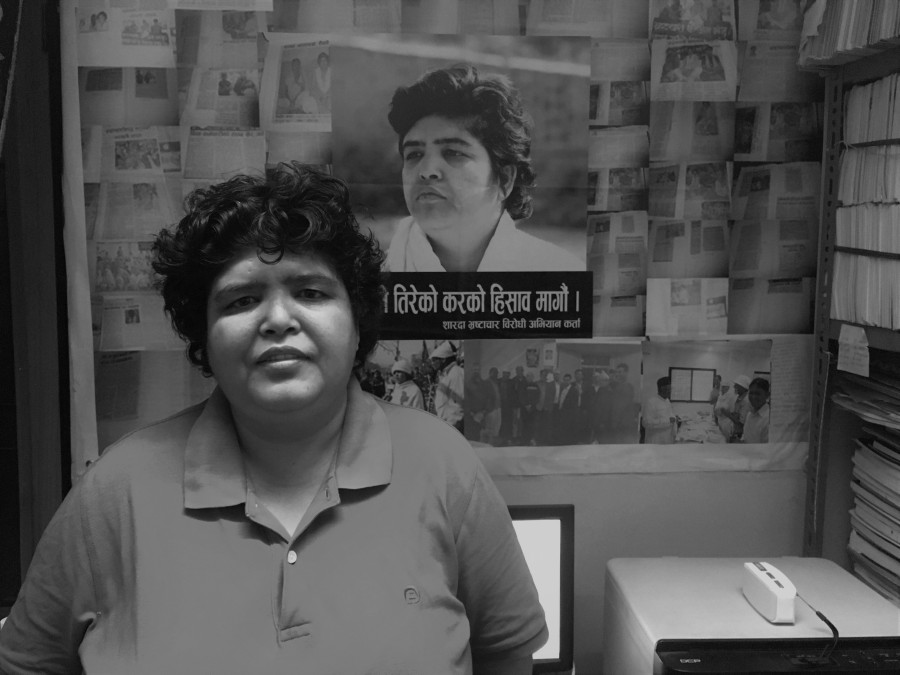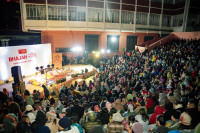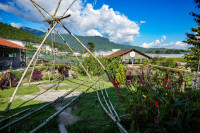Culture & Lifestyle
Activist Sharadha Bhusal Jha’s crusade for a fair society
For two decades, Jha has tried to keep the authorities in check with her campaign against corruption. And she says she’s not stopping any time soon.
Srizu Bajracharya
Sharadha Bhusal Jha’s work table at her home is covered with documents of corruption cases. The wall behind displays a board of newspaper cuttings of the corruption cases she has looked into. At the centre of this board is a banner that says: ‘hamile tireko karko hisab magau’, or ‘we need to ask for the transparency of the tax we pay the government’ in English.
It is obvious Bhusal’s work is a crucial part of her life. The 45-year-old has been working as an anti-corruption activist for more than two decades now. And her fight against corruption is what led her to establish the Sharada Foundation in 2016, a non-profit through which she is raising awareness and aiming to eradicate corruption cases in the country. Besides her work at the foundation, she also works at Bhakta BB For Humanity, a non-profit organisation based in Texas, the US, from Kathmandu, and is currently raising funds to build back houses in Ramaroshan, Achham, that were ravaged in the monsoon flood.
Bhusal describes herself as an outlier. She was never the kind of woman traditional Nepali society idealises: she was always vocal, and she always found herself questioning systems. Thus, wherever she went, she would stand out as a rebel because she would urge people, especially women, to speak out against wrongdoings.
“There was so much corruption all around us, still is. I have seen many instances of it: for example, four tractors would come to drop gravel late in the night and officials would charge money for transporting 40 tractors; people would steal electricity and sometimes government officials would also charge for electricity poles,” she said. “Even when one went to report a crime or a rape, investigation officials would ask for extra money to look into the case,” said Bhusal, adding that she saw corruption being exercised both by people and government officials in Mahottari, where she spent much of her young adult life, all the time.
And the rampant corruption she saw is how her journey as an anti-corruption activist began, about 26 years ago, when she voiced against government officials for tucking away the elderly gratuity provided by the ‘Afno Gau Afai Banau’ campaign in her village in Banauli Donauli. At the time she was beaten down for raising her voice, she says.
But Bhusal was not one to back down. Exercising her fundamental right to information guaranteed by the constitution, she made it a point to learn more about other corruption cases in her village. She would write letters to offices asking for information, and then she would collect documents and proof to file a case against them in court. Today, she has filed over one thousand corruption cases and has also gone on several hunger strikes to fight against corruption which also brought her to Kathmandu in 2011.
Yet Bhusal’s work and endeavours remain unknown to many.
“The cases that I have addressed might seem small, but you see the smaller issues reveal bigger fraudulence,” she said. Bhusal believes much of the corruption and the crimes that happen in the society is because of the silence people keep and because many communities are still uninformed and unaware. “Many people don’t have any idea about their rights in villages. They don’t even know what is wrong and right and so we need to speak to make things right, we need to build awareness so that the law is ready to protect people and so that people are ready to protect people,” she said.
Back in 2007, a rebellious Bhusal had also started an informal organisation with her friends called Brastachar Birudha Sangharsha Samittee to investigate corruption. The group didn’t last, but Bhusal kept moving forward with the campaign.
In 2012, she also demanded an answer from the then Constituent Assembly that was not able to duly complete the new constitution. And then, in 2018, she also questioned the local government of the Valley to be transparent about the tax the government collects from people. She sent out letters to thirty-two ward offices asking for information but many of these organisations didn’t even have information officers—putting a stopper to her case. “I was not quite successful with it and had also received threats but I am planning to get back to it again,” said Bhusal.
But the first time Bhusal had the clarity of becoming a torchbearer for anti-corruption was after her conversation with a lawyer about being raped and abused as a child. “I realised I had been raped when I was 18 during a gender workshop in our village. Soon after that, I had gone to file a complaint about it at the police station, but I couldn’t convince them. They didn’t believe me; nobody did.”
Later, when she consulted a lawyer he said to her, “Your statute of limitation for the crime you are reporting has already expired, and you don’t hold any power, and you don’t even have a social following that will help you with your case,” he said. “Cases like these can be filed if you have a large following,” he had said to her, she says.
And that conversation hit her hard. It was that pivotal moment that gave her clarity with her movement against corruption. After that, keeping her past aside, she started speaking out. She focused on developing her skills, immersed herself in law books and understanding law. She also took time to learn how to write official letters and file cases and slowly she built her capability to fight for justice.
“Sometimes I think people don’t speak because everyone is in this dirt together. You point at one, and you will find a handful doing the same,” she said.
Through her initiatives, she has been able to bring electricity poles to many places of Banauli Danauli, especially in Dalit settlements. She also closed down many illegal alcohol businesses at her village. She also revealed cases where people had privatised rivers, where government officials had recruited unneeded staff, cases where officials didn’t comply to transfer and held on to their positions for years.
And then in 2015, Bhusal finally decided to look back at her past and tell her life’s story to people. In her book Dharatal, Bhusal talks about her abuse and her life’s adversities and reveals former minister Modhnath Prasrit as her perpetrator. The step was necessary, she says, because she felt that Prasrit, who was inclined to power and respect in society, would never be questioned and punished if she didn’t speak at the time.
“So much time had already gone and while I lived with all the pain he [Modnath Prasrit] gave me, he was still a respected man, and so, I decided to write my autobiography to let people know about what I went through,” she said. “I felt like the book could tell my truth. The truth I carried with me everywhere and that enrages me even now.”
But when her book Dharatal came out in 2016, Modhnath Prasrit organised a press conference and denied Bhusal’s accusation of rape and sexual abuse. “He addressed me as mentally unstable and said that I was lying,” she said. That year only some small media houses covered her book. “Kantipur backed out from advertising the book, and many other media houses too. Many people accosted me; they would say I shamed my parents and I was shameless, that I am not to be trusted and I am a crazy woman,” she said.
“But I didn’t let those words take me down, I stood my ground and I did what I had to,” said Bhusal.
The conversation around the book and Bhusal’s accusation were shoved under the rug soon after. It only resurfaced recently when writer Sanjeev Uprety declined the Padmashree Sahitya Puraskar recognised by Khemlal-Harikala Lamichhane Samaaj Kalyan Pratisthan for his novel Hansa, as the organisation had also recognised Modnath Prasrit. This time, Bhusal received more support.
“I am grateful to Sanjeev Uprety for taking that stand because what didn’t happen four years back happened this time—people came in support of me, the readers who read my book confronted people for the sexual abuse I experienced,” said Bhusal.“What more could I ask,” she said.
But Bhusal is still filled with anger. Despite her contribution to society, she still feels betrayed by it, still tormented by her childhood. She has not forgotten her pain, and she is not ready to let go of that suffering. Her pain has become her catalyst to bring about change. “I will not accept injustice, I will not accept corruption and I will keep fighting against people and systems that do wrong,” she says.




 11.12°C Kathmandu
11.12°C Kathmandu















